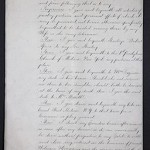The Pitfalls of Do-it-Yourself Wills
 A lot of people these days are trying to save money, which is understandable. Other people are also the do-it-yourself types, and just like feeling the independence that comes with completion of an unwanted task that a lot of people told you couldn't be done without hiring an expert. The feeling of accomplishment one feels when you put in your own carpet or install new windows on your house is great.
A lot of people these days are trying to save money, which is understandable. Other people are also the do-it-yourself types, and just like feeling the independence that comes with completion of an unwanted task that a lot of people told you couldn't be done without hiring an expert. The feeling of accomplishment one feels when you put in your own carpet or install new windows on your house is great.
However, too often people approach estate planning with the same attitude. It's tempting to walk through the office supply store and see a display for "will kits," wherein you can presumably put together a will yourself and save a bunch of money. In some cases, that may be perfect. If you have little or no assets, no spouse and no children, that might be a great choice. But in many cases, do-it-yourself wills can be full of pitfalls. And keep one thing in mind; if you make a mistake putting in carpets or windows, you or someone else can fix it later. If you pass away with a defective will, you can't come back and redo it. It's there.
A decision handed down by the Florida Supreme Court demonstrates the potential pitfalls of using a pre-printed do-it-yourself will. The case is Aldrich v. Bastile, and it serves as a cautionary tale.
Back in 2004, Ann Dunn Aldrich created her Last Will and Testament using a do-it-yourself "will kit.". In the section entitled "Bequests," Aldrich hand-wrote a list of possessions, including bank accounts, an insurance policy, a lot and a house, an IRA, and instructions in which she stated that all of the "possessions listed" go to her sister. She also wrote that, if her sister died before she did, then all of the listed assets should go to her brother.
Unfortunately, her sister did die before her, in late 2007. With her sister's death, Aldrich inherited real estate holdings and a significant amount of cash, which she put into a separate account she opened in July 2008. A few months later, in November 2008, Aldrich handwrote the following on a separate piece of writing paper with "Just a Note" printed at the top:
"This is an addendum to my will dated April 5, 2004. Since my sister Mary jean Eaton has passed away, I reiterate that all my worldly possessions pass to my brother James Michael Aldrich, 2250 S. Palmetto, S. Dayton FL 32119. With her agreement I name Sheila Aldrich Schuh, my niece, as my personal representative, and have assigned certain bank accounts to her to be transferred on my death for use as she seems [sic] fit."
The "addendum" was dated November 18, 2008 and was signed by Aldrich, and Ms. Schuh, who happened to be the daughter of James Michael Aldrich.
Based on this, it would seem obvious that, when Aldrich died on October 9, 2009, she intended that James Michael Aldrich inherit everything in Aldrich's entire estate. However, that was not the case, since the do-it-yourself "will kit" did not include what is called a "residuary clause." Such a clause would have addressed what should happen to any property not specifically listed in the will, such as the assets acquired from Aldrich's sister when she died. Furthermore, the "addendum" Aldrich wrote and signed failed to comply with state law, which requires that all wills and codicils be signed in the presence of two witnesses, and that only included the signature of a single witness.
Because of this, much of the real estate and cash that Aldrich inherited from her sister ended up going to two nieces who were the children of a predeceased brother, Laurie Basile and Leanne Krajewski. They intervened in the probate administration, and were able to claim that, because of the failures in the will's construction, they were officially "intestate heirs,' and should share in the distribution of the real estate and cash her sister had left. The lower court sided with Mr. Aldrich, the intended beneficiary, but the Supreme Court sided with Basile and Krajewski.
As you can see, dotting every "I" and crossing every "T" is very important, and the do-it-yourself route doesn't necessarily work, and can lead to assets going to unintended heirs, as well as the potential for costly litigation. They also do not take into account the future, between the time you make the will and the time you die, such as marriage, divorce or inheritance from other family members. What seems really cheap in the short run can end up costing your loved ones dearly at a time you can't fix things.
